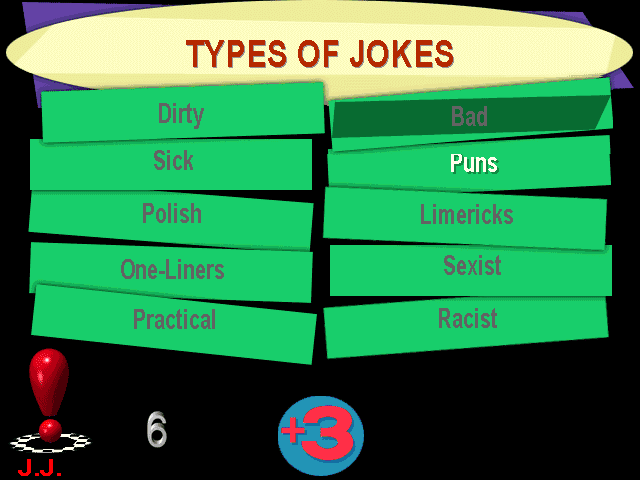There’s two things I have an unhealthy infatuation with: video games (natch) and game shows. Naturally since I like both of them, I’ve amassed a bunch of game show video games over the years. So I thought about combining them together and making an article series about game show video games. Because what better thing there is to write about than the 20 different versions of Jeopardy! that I own.
I’m gonna call this series “Game Show a Go Go.” Because I like how it rhymes. While this will cover a bunch of game show adaptations, I won’t cover video game adaptions of game shows exclusively. While there’s a bunch of game show adaptations, there are also video games that try to simulate the feel and entertainment of a game show, and I’ll cover those as well. Such as this entry, which took a simple little board game made it into something bigger.

Let’s jump back to 1995. Hasbro, wanting to get in on the burgeoning video game market, formed Hasbro Interactive. Most of their output was games based on their various board game properties, including Monopoly and Scrabble. Some of these were actually pretty good, others were fairly forgettable, thrown to the world of PC gaming obscurity.

In the late 1990s, they basically became the new company to make Wheel of Fortune and Jeopardy! games when GameTek went bankrupt. The company basically stayed on this path until Hasbro Interactive was bought by Infogrames in 2000, and now they basically are whatever is left of Atari these days. Hasbro the company would eventually get the rights back to license their board games to other companies, including EA and Ubisoft.
Now we move onto to 1998. Jellyvision’s (now Jackbox Games) You Don’t Know Jack was immensely popular, being one of the biggest PC games throughout most of the mid-90s. Naturally any Tom, Dick and Harry game publisher saw what Jack was doing and wanted in on that money by making You Don’t Know Jack-likes for the PC market. In some cases, they tried to make a trivia game styled like Jack, such as TRL Trivia and Austin Powers in Operation Trivia, or they tried to copy the goofy “adult humor” of Jack and make an original own game show-like game. This game did the latter, and did it by using a mostly-dormant board game franchise.

Remember Outburst? It’s that one board game where you shout out as many answers to a category as you can. It’s not a classic, but it’s one of those party games that gets thrown in along with Taboo and Catchphrase. Hasbro enlisted the development of Outburst by a small games company known as CyberDice.
Not to be confused with the company that pumps out Battlefield and Star Wars games every two years, CyberDice was a development studio that only made a handful of party games under the parent company of Hersch and Company, the company that actually owns the Outburst brand. From the brief research I did online, the only other game these developers are credited for is Super Scattergories. I’m going to hazard a guess the developer folded shortly after the dot-com bubble burst.
Though, they’re not the only developers involved: Engineering Animation Inc (EAI), who likely handled some of the CG animation, and surprisingly, a pre-Shantae Wayforward. I can’t tell you exactly what they did as there’s only credits for the publisher and some of the production staff, but they are mentioned in the manual, and founder Voldi Way is given a special thanks credit. In a sense, we’re finding out that developer’s humble beginnings is no different than they are now: Adapting some of the biggest properties into video games.

Outburst the computer game is basically formed like a TV game show. You can play by your lonesome or with other players, online or off. The game has multiple rounds of play, all based on the general theme of giving as many answers as you can within the time limit. After some rounds, you can earn bonus points by having the randomizer hit an answer you gave. The team with the most points after seven rounds wins.
